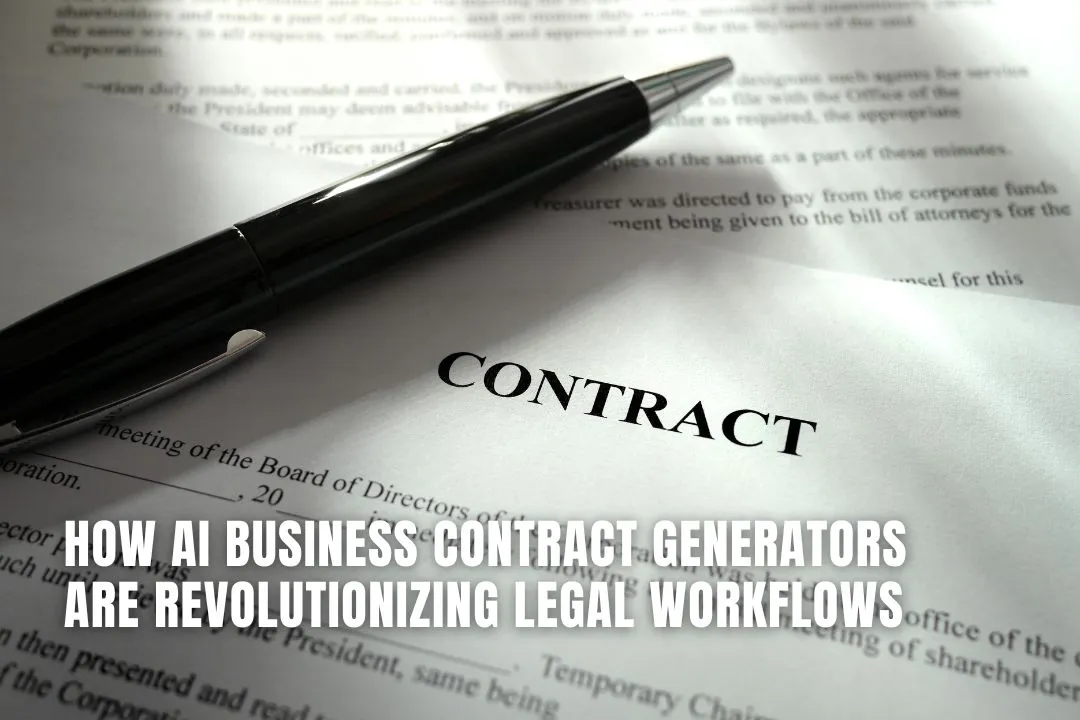
Legal work has long been known for its meticulous nature, lots of documents, loads of revisions, and a constant need to maintain accuracy under pressure. For legal teams and businesses alike, managing contracts can feel like a never-ending balancing act between speed, compliance, and clarity. But AI business contract generators are stepping up as a powerful new solution. Tools like AgreementGen by Lumin are not just helping legal teams do their jobs more efficiently, they’re changing the way legal documents are created, reviewed, and managed.
With artificial intelligence now deeply embedded into contract creation workflows, businesses are seeing a fundamental shift in how agreements are drafted, shared, and finalized. Let’s explore how AI agreement generators are transforming legal operations starting with what makes them different from the traditional approach.
AI contract generators are more than just digital document templates. They represent a leap forward in how legal agreements are built and managed. These tools harness technologies like natural language processing (NLP) and machine learning to understand, generate, and optimize contract language in real time.
So what sets an AI business contract generator apart from traditional drafting methods?
Traditional contract creation typically involves manual input, legal jargon written from scratch, and countless revisions. In contrast, AI-driven platforms like AgreementGen work by learning from existing contract data, understanding legal language patterns, and automatically applying this knowledge to generate customized agreements.
Let’s break down some of the top features:
That’s why agreement generator AI tools are gaining serious traction in both legal teams and broader business environments.
Before AI came into the picture, contract creation was often a source of friction.
Manually drafting contracts takes time, and that time adds up quickly. Even small errors, like inconsistent terminology or outdated clauses, can create huge headaches down the line. Legal teams often found themselves buried in repetitive tasks: reusing templates, double-checking compliance, and going through lengthy approval chains.
Some common issues that arise in traditional processes include:
The result? A legal workflow that feels outdated, inflexible, and costly. Especially as companies grow, scaling this kind of manual process becomes difficult.
This is where AI business contract generators step in and offer an entirely new experience for legal professionals.
AI contract generators drastically reduce the time it takes to draft and finalize agreements. Instead of spending hours (or days) writing, reviewing, and redrafting, legal teams can generate agreements in minutes, with the confidence that key details are accurate and complete. AI tools bring an immediate boost in productivity, especially when handling high volumes of contracts.
One of AI’s biggest strengths is consistency. It remembers preferred wording, applies standard clauses without deviation, and reduces the risk of miscommunication. The AI picks up on even minor inconsistencies, ensuring all language stays aligned from the first draft to the final signature.
Tasks like checking clause consistency, suggesting updates, or flagging missing elements? AI handles them behind the scenes. This means that instead of spending time on repetitive edits, legal professionals can focus on reviewing and negotiating more complex aspects of the agreement.
AI tools are trained to stay up to date with current legal regulations. A powerful agreement AI generator can automatically cross-check contract terms against recent laws, flagging any outdated or non-compliant language. This proactive feature helps businesses avoid potential legal issues before they happen.
The benefits go far beyond the legal department. Businesses of all sizes are recognizing how AI contract generation tools offer broader value.
By decreasing the need for repeated edits, reducing human error, and minimizing dependence on outside legal counsel, AI business contract generators help companies lower legal costs. Instead of paying for legal hours spent fixing avoidable mistakes, businesses get it right the first time.
AI tools like Lumin’s Agreement Gen allow for real-time collaboration between departments. Need the finance team to review a clause? They can jump in immediately. Legal, sales, and operations teams can all work on the same version without the version control nightmares that come with emailing documents back and forth.
As a company grows, so does its volume of contracts. AI solutions make it possible to handle hundreds, or thousands, of agreements without a drop in quality. Whether you're creating an NDA or using an AI lease agreement generator, the AI delivers consistent output at any scale.
Every contract teaches the AI something. Over time, AI contract drafting tools build intelligence based on past agreements, identifying patterns, preferences, and areas for improvement. This makes future contracts smarter, and faster, to generate.
Of course, not every legal team is quick to adopt new technology. Concerns around trust, integration, and control can make even the most promising tools feel risky.
Here’s how businesses are addressing those concerns:
It’s also important to recognize that AI isn’t acting alone. It’s a tool, not a replacement. Human oversight remains critical, especially for high-value or complex agreements. But with AI handling the repetitive groundwork, legal professionals can do what they do best: analyze, advise, and negotiate.
AI-powered tools like AgreementGen by Lumin are completely changing the way businesses handle contracts—making them faster to create, easier to manage, and more accurate.
As more companies start using AI for contract work, legal teams are freed up to focus on what really matters: making good decisions, not just drafting documents. The future of contracts? It's already here, and it works better.